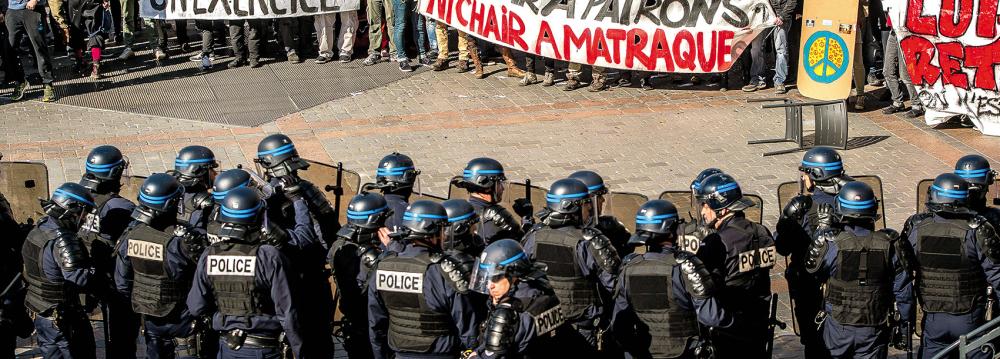Protesters have hit the French streets as proposed reforms to the country's labor rules move closer to parliament.
The battle lines are drawn in a make-or-break moment for the socialist government.
Police and protestors clashed in Marseille and the capital Paris on Thursday, where a strike by air traffic controllers canceled 20% of all flights at Orly Airport and caused delays at Charles De Gaulle, AP reported.
The photos show a cloud of tear gas around the statue of the Place de la Nation during clashes between youths and police in Paris which was part of the nationwide labor reform protests and strikes.
Riot police using tear gas also intervened in protests in cities such as Nantes on France’s western coast. Workers burned tires at road blocks across the country.
The government’s draft bill, which will be debated by parliament starting next Tuesday, aims to amend the 35-hour working week and relax other labor rules.
The 35-hour week would remain as the foundation of labor law, but the proposal would allow companies to organize alternative working times without industry-wide deals. Workers would also be able to put in a 48-hour week or 12-hour shifts.
The reforms have already been watered down under pressure following an earlier wave of protests.
President Francois Hollande hopes to stand for reelection next year but his popularity can be judged by the 58% of French people who are opposed to the measures, according to a recent poll.
The labor code has traditionally been regarded in France as untouchable. Successive governments have made piecemeal amendments to its 10,000 articles, lifting restrictions on layoffs and working hours, but without a comprehensive overhaul.
The changes proposed now by Socialist Party PM Manuel Valls are seen as a test of the reformist credentials of the government and possibly also a turning point in France’s struggle with 10% unemployment nationwide.
On a wider level, they also play into debates about the sustainability of France’s social and economic model, and moving the country, for many reluctantly, towards a less regulated approach to business.
Stand Up and Deliver
Union leaders are seeking to maintain the momentum of a movement that has staged four separate days of protest over the legislation.
The head of the large CGT union attacked the proposed law, saying it would allow employers to “short-circuit national regulation of basic worker rights by giving bosses greater freedom to set terms of pay, rest and overtime rates.”
Meanwhile, Socialist Party dissidents have also presented a “counter-reform,” with protests being led by former Socialist Party leader and author of the 35-hour week, Martine Aubry. She resigned from all her official positions within the party, condemning the law as a betrayal of the French “social contract.”


